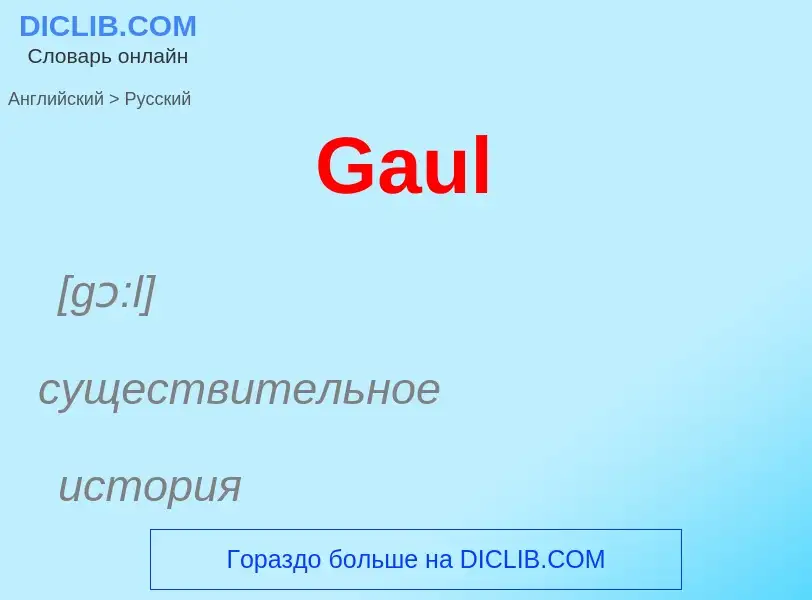Vertaling en analyse van woorden door kunstmatige intelligentie ChatGPT
Op deze pagina kunt u een gedetailleerde analyse krijgen van een woord of zin, geproduceerd met behulp van de beste kunstmatige intelligentietechnologie tot nu toe:
- hoe het woord wordt gebruikt
- gebruiksfrequentie
- het wordt vaker gebruikt in mondelinge of schriftelijke toespraken
- opties voor woordvertaling
- Gebruiksvoorbeelden (meerdere zinnen met vertaling)
- etymologie
Gaul - vertaling naar russisch
[gɔ:l]
существительное
история
Галлия
галл
редкое выражение
француз
['gæliə]
синоним
Definitie
Wikipedia
Gaul (Latin: Gallia) was a region of Western Europe first clearly described by the Romans, encompassing present-day France, Belgium, the Netherlands, Luxembourg, and parts of Switzerland, Germany, and Northern Italy. It covered an area of 494,000 km2 (191,000 sq mi). According to Julius Caesar, who took control of the region on behalf of the Roman Republic, Gaul was divided into three parts: Gallia Celtica, Belgica, and Aquitania.
Archaeologically, the Gauls were bearers of the La Tène culture during the 5th to 1st centuries BC. This material culture was found not only in all of Gaul but also as far east as modern-day southern Poland, and Hungary.
Gallia Cisalpina was conquered by the Romans in 204 BC and Gallia Narbonensis in 123 BC. Gaul was invaded after 120 BC by the Cimbri and the Teutons, who were in turn defeated by the Romans by 103 BC. Julius Caesar finally subdued the largest part of Gaul in his campaigns of 58 to 51 BC. Roman control of Gaul lasted for five centuries, until the last Roman rump state, the Domain of Soissons, fell to the Franks in AD 486.
While the Celtic Gauls lost their original identities and language during Late Antiquity, becoming amalgamated into a Gallo-Roman culture, Gallia remained the conventional name of the territory throughout the Early Middle Ages, until it acquired a new identity as the Capetian Kingdom of France in the high medieval period. Gallia remains a name of France in modern Greek (Γαλλία) and modern Latin (besides the alternatives Francia and Francogallia).



![Celtic]] ethnicities: '''Celtae''', '''Belgae''' and '''Aquitani'''. Celtic]] ethnicities: '''Celtae''', '''Belgae''' and '''Aquitani'''.](https://commons.wikimedia.org/wiki/Special:FilePath/Gaul, 1st century BC.gif?width=200)


![Parisii]], 1st century BC, ([[Cabinet des Médailles]], Paris). Parisii]], 1st century BC, ([[Cabinet des Médailles]], Paris).](https://commons.wikimedia.org/wiki/Special:FilePath/ParisiiCoins.jpg?width=200)
